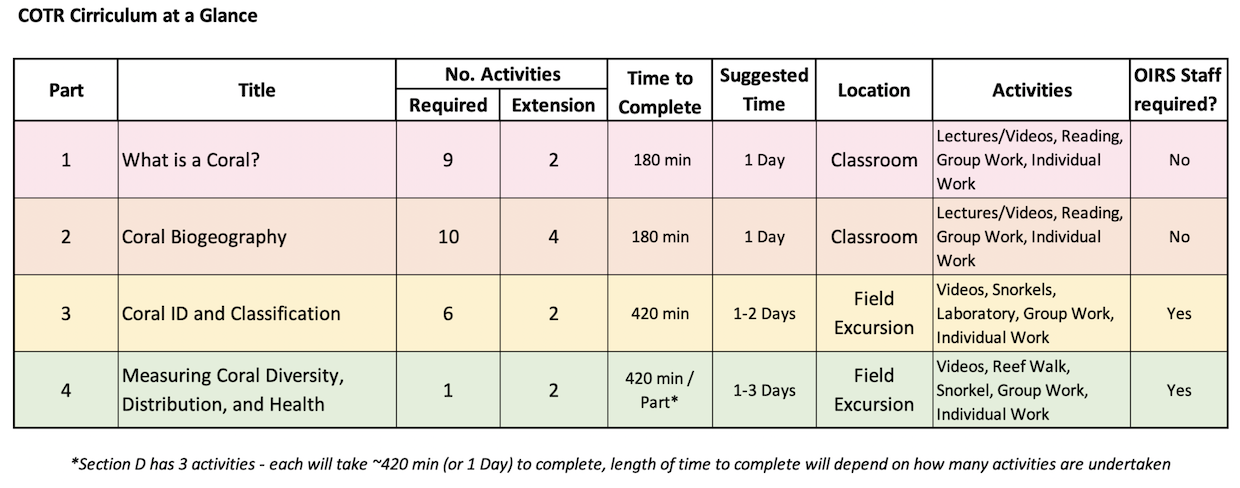What is Classroom on the Reef?
Classroom on the Reef (COTR) is an educational endeavour providing secondary students with hands-on marine science experience. The Classroom on the Reef curriculum uses coral reefs as an example ecosystem from which science theory can be applied with the intention to (1) promote achievement in STEM subjects by aligning with the secondary school marine science curriculum, and (2) foster a pathway for students interested in pursuing tertiary education in a physical science. Our Classroom features live streaming underwater cameras, weather stations and underwater sensors that provide data in real-time, and exposure to ongoing research investigations at a world-class research facility. Components of the Classroom on the Reef curriculum can be accessed online and taught remotely at your school, or can be delivered in collaboration with an excursion to OIRS for an immersive, experiential education program. A visit to our Classroom will change the way you look at science!
Where is Classroom on the Reef taught?
COTR can be taught in your own classroom, at our research facility on the Great Barrier Reef, or a combination of both. See our curriculum for resources available to you and your students NOW and get a glimpse of the activities we can undertake when you visit us at the reef. Our Classroom is located at JCU’s Orpheus Island Research Station (OIRS). The OIRS is based in the National Park on Orpheus Island which is part of the Palm Island Group off the coast of North Queensland. A trip to ‘the reef’ will involve a transfer via boat from Lucinda to Orpheus Island where your class can stay at the Research Station in comfort for the duration of their program. The research station is well equipped to support large groups with dorm-style housing, large communal kitchens and dining facilities, a formal lecture hall, wet and dry laboratories, and a large supply of snorkeling equipment. The station boasts access to both fringing and mid-shelf coral reefs from a range of sheltered and exposed habitats supporting a diverse assemblage of flora and fauna. Reefs can be accessed from the shore directly in front of the station, or at sites around the Palm Islands via a fleet of vessels available at the station. You can find out more about the facilities at OIRS by visiting:https://www.jcu.edu.au/orpheus-island/facilities
Who will deliver Classroom on the Reef content to your students?
The Classroom on the Reef curriculum is designed to ‘self-teach’ instructors by providing comprehensive answers to all tasks in the ‘TEACHER’ manual of each Unit. These manuals will help teachers navigate the curriculum on their own, without the support of a Classroom on the Reef staff member, for example, in their classroom at school ahead of their trip to the reef. Once at the Orpheus Island Research Station (OIRS), a Classroom on the Reef/OIRS staff member will help deliver content to your students with prior arrangement.
How is work assessed / marked in Classroom on the Reef?
The Classroom on the Reef curriculum provides marking rubrics with a framework for the number of points allotted for each assessible task, and guidelines for determining how many points to award. Marking assessment in the Classroom on the Reef curriculum can easily be managed by teachers and can also be completed in collaboration with Classroom on the Reef staff with prior arrangement.
Table 1. The Classroom on the Reef curriculum at a glance.

How does Classroom on the Reef align with the Queensland Marine Science Syllabus (2019)?
Classroom on the Reef has been designed to satisfy many of the subject matters listed under Unit 3 – Marine systems – connections and change in the Queensland Marine Science Syllabus. Specifically, we’ve aligned the lesson plans in Classroom on the Reef to link with Unit 3, Topic 1: The reef and beyond. See detailed comparison in the table below (Table 2) which helps clarify where Classroom on the Reef – Units 1 and 2 satisfy specific requirements of the Queensland Marine Science Syllabus (2019):
Table 2. Linkage between Qld Marine Science Syllabus (Unit 3 – Marine systems, Topic 1: The reef and beyond) with Classroom on the Reef Units 1 and 2.
